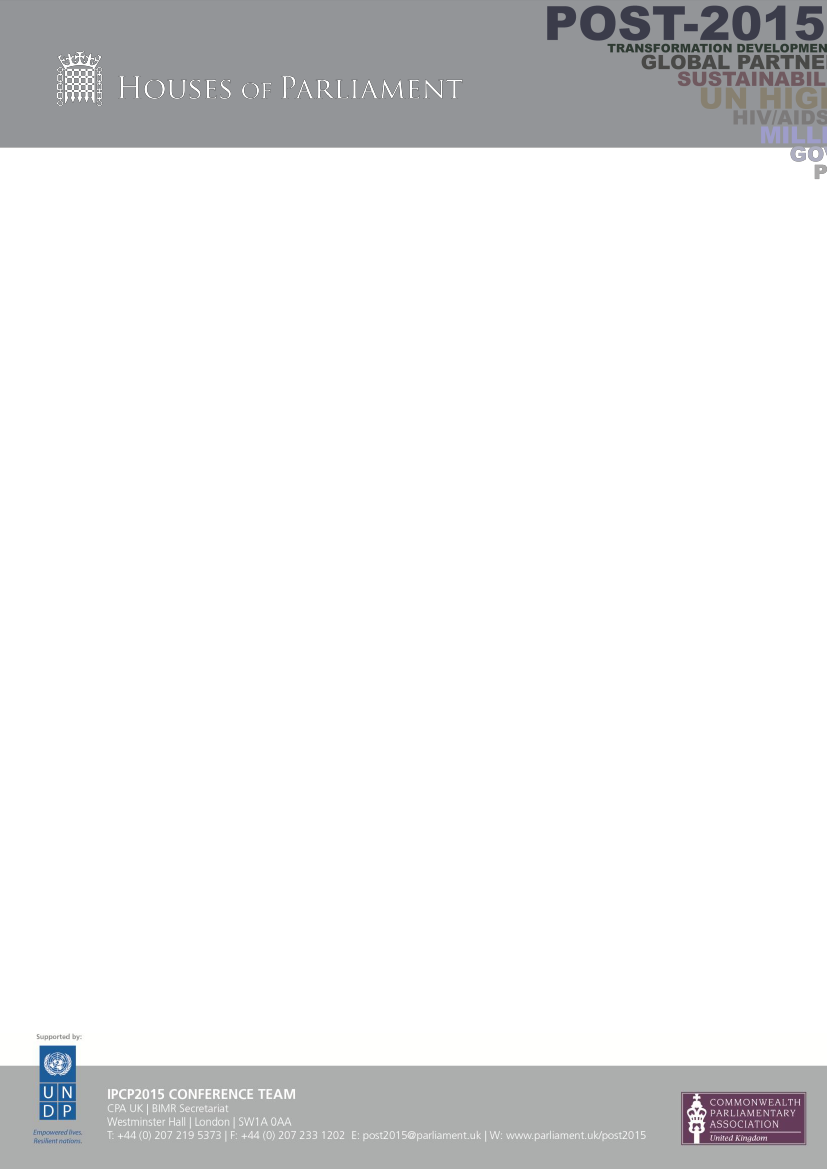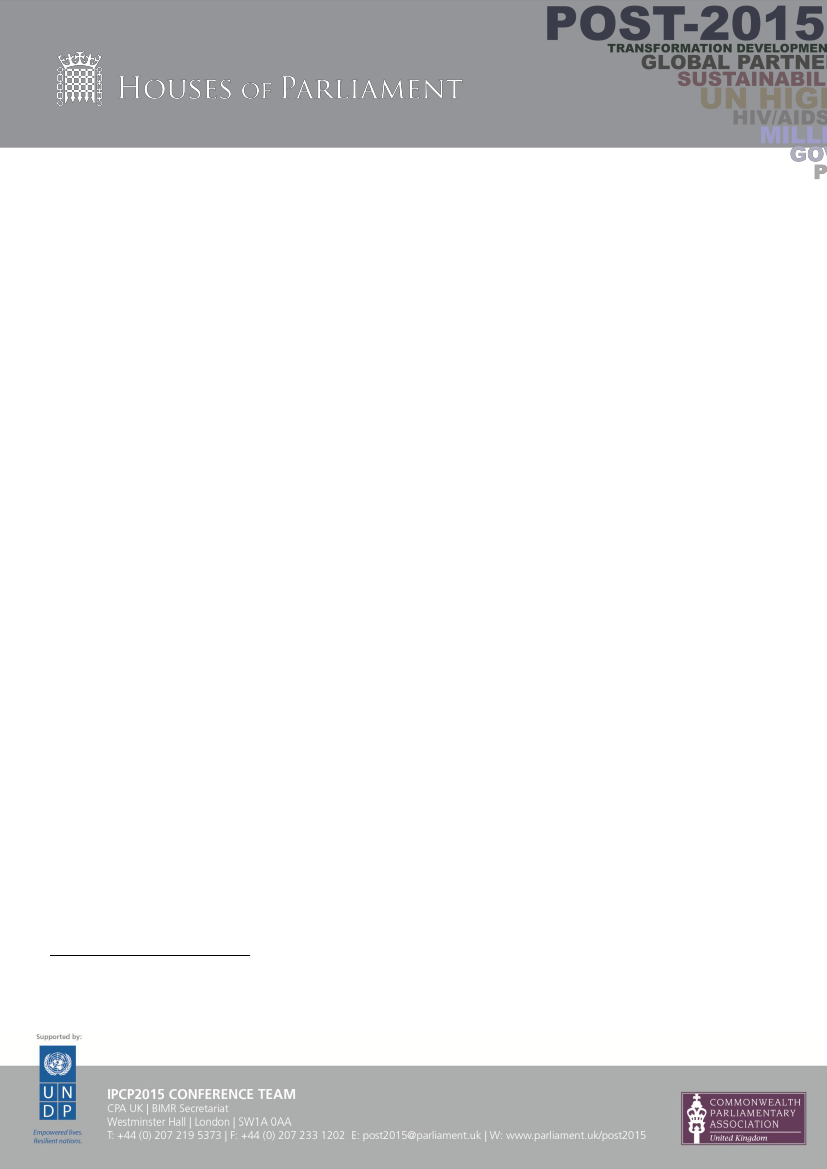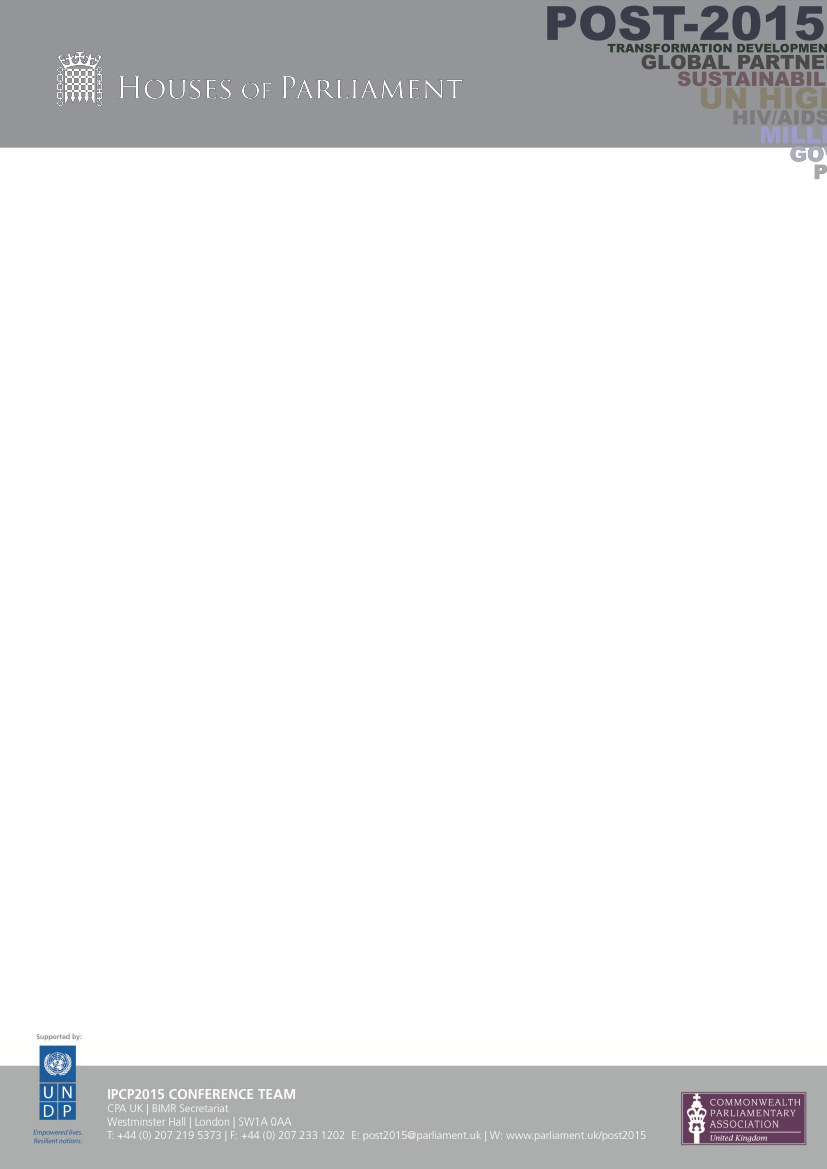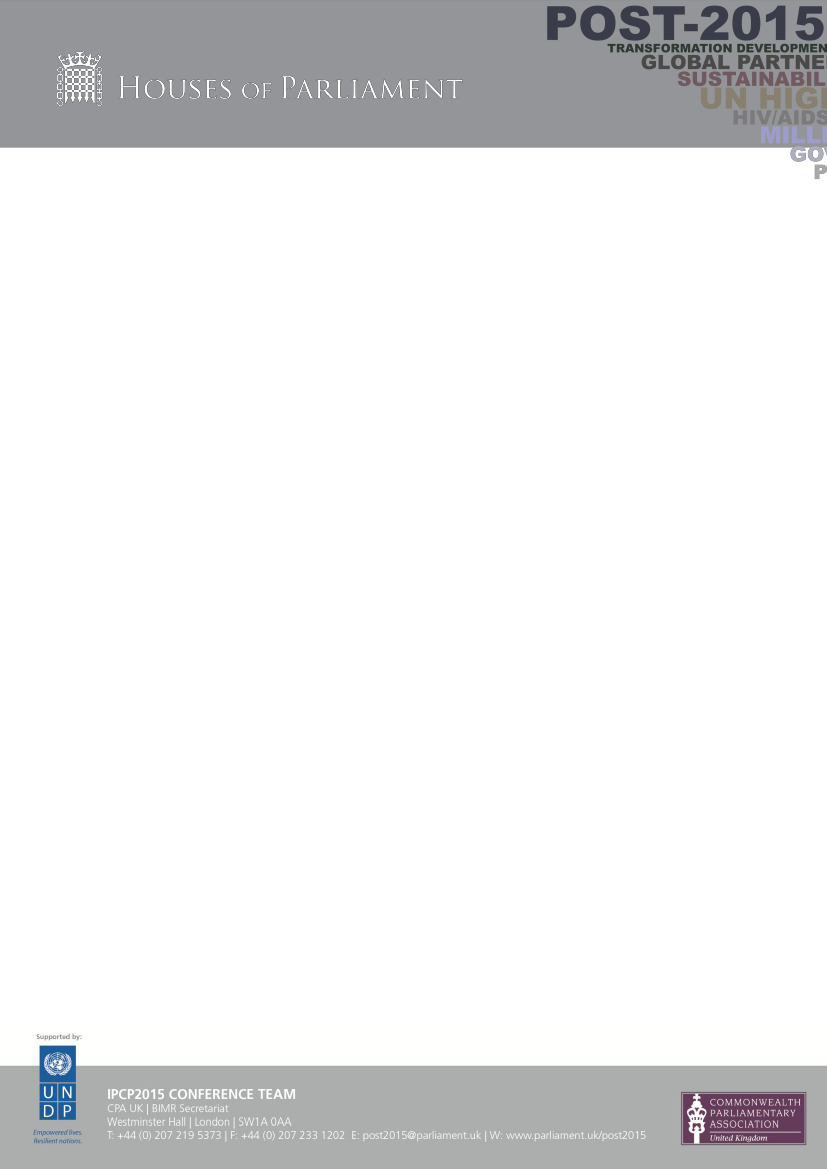Udenrigsudvalget 2013-14
URU Alm.del Bilag 59
Offentligt
CONFERENCE COMMUNIQUÉ1.We,the60parliamentarians from32parliaments of Commonwealth and non-Commonwealth countries, met at theHouses of Parliament in London 26-28 November 2013. Our purpose was to express our commitment asparliamentarians from across the world to accelerate the process towards the achievement of the MillenniumDevelopment Goals (MDGs); to exchange information, knowledge and examples of good practice with peers andinternational development experts; to build our capacity to ensure that good governance is at the core of the post-2015 development agenda; and to commit to holding governments to account to ensure that internationalcommitments to development are implemented at local, national and regional levels.
2.We acknowledgethe critical role that parliamentarians have as key stakeholders in the design, implementationand oversight of the post-2015 framework.We recognisethe unique responsibility of elected parliamentarians tobe the bridge between governments and citizens andwe affirmour commitment as the people’s representatives towork towards a set of targets with poverty eradication and sustainable development at its core. Integral to theframework are effective and legitimate institutions that support peace and security, the rule of law, property rights,freedom of expression and a free media, open political choice, access to justice, and accountability.
3.We recallthe importance of the Millennium Declaration that led to the creation of the MDGs which provide acommon purpose, raised awareness of the world’s poorest people, mobilised public support and aligned globaldevelopment actors around a set of concrete, time-bound benchmarks.We welcomethe significant progress thathas been achieved in meeting several important targets, despite the impact of the global economic and financialcrisis.
4.We remainconcerned by the unevenness and gaps in the achievement of the MDGs and the immense challengesthat remain.We recognisethe specific challenges and needs of the least developed countries, small islanddeveloping states and landlocked developing countries some of which are not on track to achieve the MDGs by2015.We also recognisethe special challenges in meeting the goals faced by people living in conflict and post-conflict countries, and in areas affected by complex humanitarian emergencies and natural disasters.
5.We recognisethe important contributions and outcomes from the major international discussions on the post-2015development agenda, notably the UN General Assembly's Special Event towards achieving the MDGs1in whichMember States renewed their commitment to meet the MDGs and agreed to hold a high-level summit inSeptember 2015 to adopt a new set of goals.
6. With respect to the post-2015 agenda,we callon governments to ensure that there is a single set of goals, whichwhilst taking account of differing national circumstances and respecting national policies and priorities, areuniversal and achievable.
7.We strongly supportplacing gender equality at the heart of the post-2015 development framework with astandalone goal as proposed at the 57thSession of the Commission on the Status of Women in March 2013.Werecognisethat without gender equality other goals on access to education and development of appropriatecurricula, poverty eradication, and maternal health will never be achieved.
8.We recognisethat all parliaments through their legislative, oversight, budget approval and representationalresponsibilities are key stakeholders in accelerating progress in achieving the MDGs and monitoring theimplementation of the post-2015 development agenda.
9.We recognisethe critical role of Overseas Development Assistance (ODA) in realising the MDGs and post-2015development agenda towards all countries attaining economic independence.We callon all development partnersto be transparent and accountable in the delivery framework of ODA with the private sector, NGOs andgovernments.
10.We pledgeto build on the knowledge and learning from this conference.We committo the Post-2015 Action
Plan for Parliamentarians and encourage our fellow parliamentarians to implement these recommendations.
1
On 25 September 2013, the President of the UN General Assembly hosted a special event on the MDGs to follow up effortsmade towards achieving the Millennium Development Goals. The discussions focused on analysing the gaps and weaknesses inthe implementation of the MDGs, ways to accelerate progress and a reflection on elements for a post-2015 development agenda.
POST-2015 ACTION PLAN FOR PARLIAMENTARIANSFrom 25-28 November 2013, 60 parliamentarians from 32 countries assembled in the Houses of Parliament inLondon with a clear commitment to engage with the post-2015 development agenda. The members had a commonpurpose to commit to a set of recommendations, agreed by the participants through their discussions that take theform of an action plan to enable all parliamentarians to engage in the design, implementation and oversight of thepost-2015 agenda.
Recognising the successes and learning the lessons from the MDG process, the parliamentarians agreed the followingaction plan.
1.
We supportconsensus that a set of key principles should underpin the new development goals:a.Democratic governance– by building and strengthening effective institutions that are participatory,transparent and accountable.b.Human rights– by upholding the Universal Declaration of Human Rights, respecting all internationallyrecognised human rights and fundamental freedoms, including the right to development.c.Sustainable development– by ensuring that economic, social and environmental sustainability areincluded in disaster risk reduction, peace and security, resilience and the recognition of the impact ofclimate change into the framework.d.Equality– by ensuring that no one is left behind and that the appropriate measures are in place to protectand promote equality, equity, and social inclusion by incorporating them into laws, policies andprogrammes.e.Global partnership– by fostering a new spirit of solidarity, cooperation, and mutual accountability whichensures effective and equitable financing for development and delivers on all commitments.
2.
We callon governments to maintain their commitment to a transparent process, which includes input from allstakeholders including civil society, scientific and knowledge institutions, parliaments, local authorities, and theprivate sector.
3.
We affirmour commitment as parliamentarians to influencing the formulation of the new development goals byengaging with the intergovernmental negotiations and policy discussions at local, national and regional levels by:a.Promotingdiscussion through parliamentary debates and questions to obtain information, raise
awareness, to hold our governments to account and to draw media attention to the post-2015 debate.b.Conductingcommittee hearings that investigate national priorities in greater depth and that giveopportunities to hear testimony from independent experts and civil society representatives.c.Conveningconstituency meetings and public fora to establish dialogue with members of the public toinform them of the issues and ensure their voices are heard.d.Engagingwith relevant stakeholders such as local authorities, civil society organisations, the media andthe private sector by sharing information and supporting their participation in decision-making.e.Providingrepresentation to women and young people, and vulnerable and marginalised groups to ensurethat they will be at the centre of the post-2015 agenda.
4.
We agreethat parliamentarians need to uphold effective institutional mechanisms for monitoring theimplementation of the new development goals.We committo:a.Introduce, scrutinise and reviewlegislation to ensure that the new development goals are reflected innational policies and that the necessary enabling legislation is in place.b.Overseepolicy implementation to ensure our governments and other stakeholders are held to account intheir international commitments.c.Advocate forthe adequate, efficient and transparent allocation of resources in national and local budgetsto ensure they are prioritised in the best way to make progress towards the new development goals.d.Providerepresentation to all sectors of society by ensuring that citizens, different stakeholders and civilsociety groups have a voice at the national level and are able to participate in the decision-making process.e.Fosterdebate on innovative, fair, transparent and accountable mechanisms – including ensuring fairertrade – by which to achieve the post-2015 agenda.




